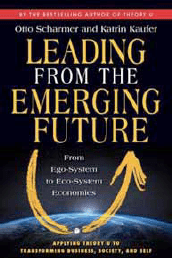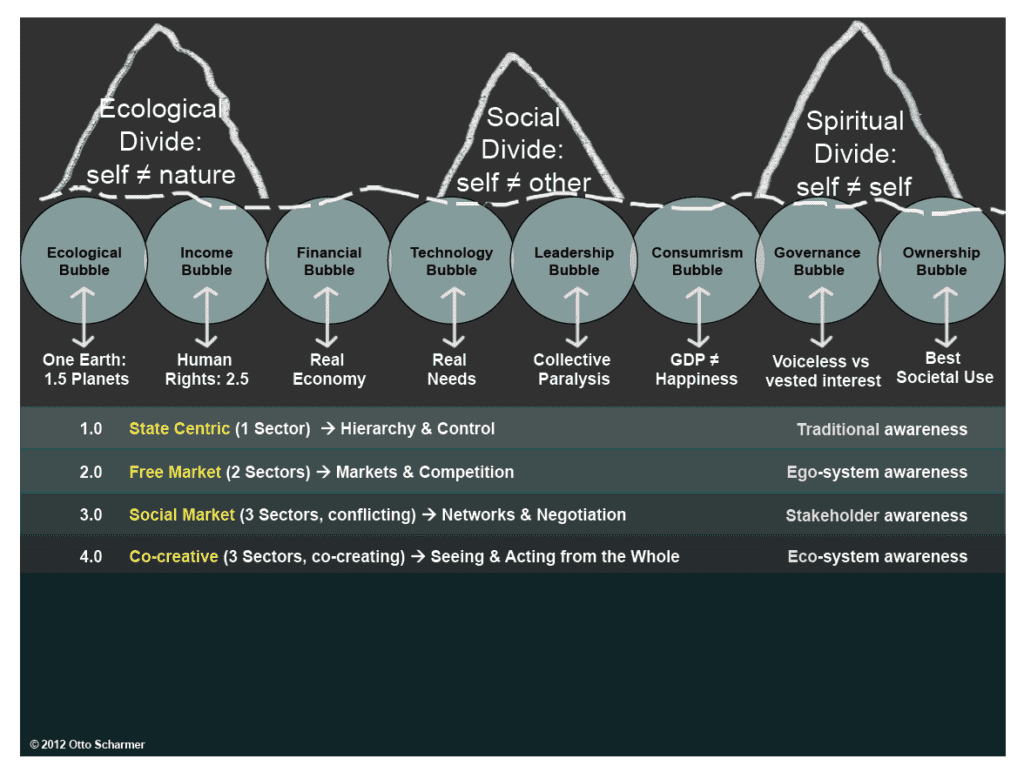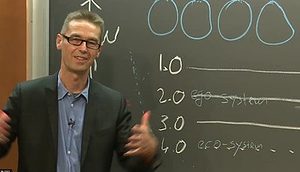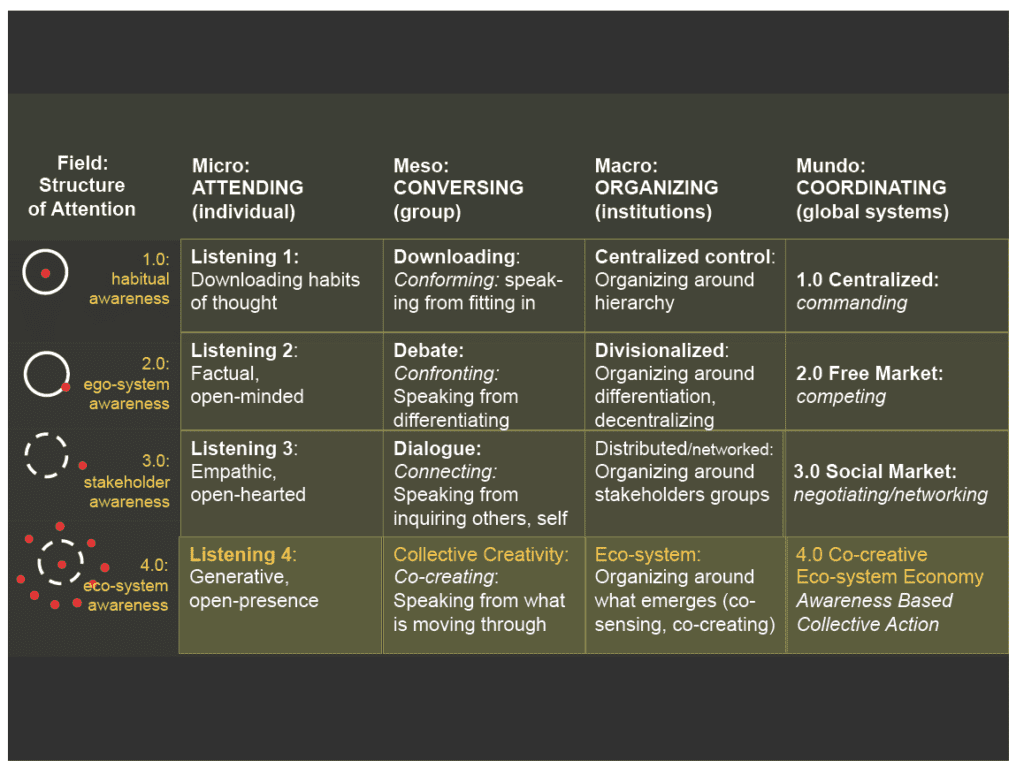“We are collectively creating results nobody wants”, says Otto Scharmer (famous for Theory U). That’s why leadership should help people to see the whole system. It is time to change our organizations and institutions, and bust three leadership myths. Make your difference and start with this blog post!
Otto Scharmer is a senior lecturer at Massachusetts Institute of Technology and co-founder of the Presencing Institute. He developed Theory U with colleagues Peter Senge and Joseph Jaworski.
Theory U is a framework based on 18 years of interviews, action learning and research initiated by the intriguing question: Why do some change tools work well in the hands of some practitioners, while in other cases no significant change occurs? Theory U describes a process of learning and change. The gist: the quality of results achieved by any system depends on the quality of awareness from which people in the system operate.
 Scharmer’s latest book, written with Katrin Kaufer, is “Leading from the Emerging Future: From Ego-system to Eco-system Economies”. The subtitle explains the book’s wide perspective: Applying Theory U to transforming business, society and self.
Scharmer’s latest book, written with Katrin Kaufer, is “Leading from the Emerging Future: From Ego-system to Eco-system Economies”. The subtitle explains the book’s wide perspective: Applying Theory U to transforming business, society and self.
Wow! That is a huge challenge. The book presents a framework that can help change-makers understand where they are and how they could move forward. Each chapter concludes with journaling questions for reflection and questions to discuss in a coaching circle. This book is not just meant to be read: it addresses the “who” and “how” of change, and gives guidance for how to start practicing. What can YOU do? How can you make your difference?
Results nobody wants: three divides
Scharmer and Kaufer state that we are collectively creating results that nobody wants. They describe an “iceberg model” in which they discern three visible divides “above the waterline”:
The ecological divide: we currently use 1.5 times Planet Earth; that is our ecological footprint. This is the divide between self and nature.
The social divide: 2.5 billion people live on less than $2 a day, for instance… Here we see the divide between self and other.
The spiritual-cultural divide: people are excluded, experience lack of meaning and more and more feel depressed; here’s the divide between self and Self. Capital Self represents your highest future potential that you may develop – what you are here for on Planet Earth.
(This corresponds with Charles Eisenstein’s work about the Story of Separation – that I will review in another blog post).
 Below the waterline are eight systemic disconnects that cause the three divides. You can see them as eight acupuncture points of economic and social transformation – if we fix them. This is recommended reading if you want to amplify your positive impact: you can explore the ecological, income and wealth, financial, technology, leadership, consumerism, governance and ownership issues in Chapter 3: summarized in the insightful Matrix of Economic Evolution. Why not focus on the field that resonates with you most – and start making your difference there?
Below the waterline are eight systemic disconnects that cause the three divides. You can see them as eight acupuncture points of economic and social transformation – if we fix them. This is recommended reading if you want to amplify your positive impact: you can explore the ecological, income and wealth, financial, technology, leadership, consumerism, governance and ownership issues in Chapter 3: summarized in the insightful Matrix of Economic Evolution. Why not focus on the field that resonates with you most – and start making your difference there?
These eight fields show four levels of systemic evolution.
 Ego system awareness to Eco system awareness: four levels
Ego system awareness to Eco system awareness: four levels
1.0 state-centric; hierarchy and control
2.0 free market; competition
3.0 social market; negotiating, special interest groups
4.0 co-creative eco system awareness; whole system awareness
Our current 2.0 mindset is outdated
Scharmer’s point is: We cannot solve our current 4.0 problems with our 2.0 mindset. Our 21st-century world has developed into a 4.0 connected-complex-whole-eco-system. But our thinking is stuck in 2.0: based on scarcity, fear, competition, and control. We’re way behind.
The only way to truly change is to upgrade the awareness of the participants in a system. Here’s the biggest lever for change, below the eight disconnects: our outdated paradigms and beliefs. The Matrix of Social Evolution shows us how we behave on each level, whether we are an individual (micro: attending), a group (meso: conversing), an organization (macro; organizing) or global system (mundo: coordinating).
 We need to work on these levels, as individuals (personal development from me to we: how we focus attention and open our minds, heart and will), in our relations (interpersonal development from ego to eco, how we relate in conversations), and in our institutions (organization development to become aware of the whole and to allow the organization to see itself…). Sounds mystical maybe, summarized like this – but read the book and you’ll see.
We need to work on these levels, as individuals (personal development from me to we: how we focus attention and open our minds, heart and will), in our relations (interpersonal development from ego to eco, how we relate in conversations), and in our institutions (organization development to become aware of the whole and to allow the organization to see itself…). Sounds mystical maybe, summarized like this – but read the book and you’ll see.
Leadership is connecting what was separated
There’s no way to summarize an extensive book like this. But let me share what Scharmer and Kaufer say on leadership: Decision makers are disconnected from the people affected by their decisions – so they don’t see what they cause. There is no closed feedback loop. Instead there is fragmentation and a disconnect. Top-down leadership doesn’t work anymore because the world is no longer in silos but everything is connected to everything. Leaders cause side-effects beyond their knowing. Here’s why we collectively create results nobody wants.
The biggest leadership challenge today is that our awareness is fragmented and focused on ego: “what’s in it for me?” Real leadership work is to help people see the whole and change their perspective from “me” to a systems view: “we”.
Whether it is silos in departments that prevent people to share a collective purpose in an organization or whether it’s an ecological disconnect (that keeps me eating tons of meat without realizing the effects on the environment and others). The leadership challenge is to help people become aware of connection and wholeness. Leaders, managers and change-makers in thousands of organizations and situations can facilitate this change by pointing out what it would be like for the “opponent”, to see the “other side”, and to consider side-effects for “far-away others”.
Back in the past, leadership 0.0 was communal; shared in the community.
1.0 is top down in a hierarchical pyramid, aligned with centered organizations.
2.0 is delegation and competition, aligned with decentralization in organizations.
3.0 is participatory, relational leadership in a networked, stakeholder environment.
4.0 leadership is co-creating with the wellbeing of the whole in mind!
Where is your organization at this point? And where are you?
(Compare this to Frederic Laloux’ stages of organization development and you can see that 4.0 Leadership is Teal leadership in his model).
Helplessness
 The helplessness that many people feel when looking at our current world is the result of a lack of leadership; we need a new, whole perspective, says Scharmer. I’d like to add that we also need to come up with actionable ideas at a local level.
The helplessness that many people feel when looking at our current world is the result of a lack of leadership; we need a new, whole perspective, says Scharmer. I’d like to add that we also need to come up with actionable ideas at a local level.
Scharmer and Kaufer emphasize that we first need to bust three leadership myths:
1. The leader is the guy at the top – instead, today everyone must be involved to find solutions and respond.
2. Leadership is about individuals – instead, today a better definition is that leadership is the capacity of a system to sense and shape the future.
3. Leadership is about a vision – instead, today leadership is above all about listening. As Theory U describes: immerse in listening and observing, become still and reflective, next, act when you sense what is “wanting to emerge” and co-create with this sensed reality instead of trying to impose your plan or vision upon reality.
What’s missing today in organizations is this collective sensing: the Theory U process of attention and learning and a whole-system-dialogue. Prototyping is also missing: exploring things by doing them. Don’t wait until you know everything, but learn by doing.
It takes personal and group development to become aware of who we are and how we create social reality by what we give attention. It is equally essential to practice true, respectful dialogue and learn to be open.
But, in spite of this personal and group development: nothing will happen if we don’t succeed to transform our key institutions, that coordinate and create the global system. We must diminish strict hierarchy, fragmentation, and competition and we must cultivate dialogue and co-creation on a large scale. We must upgrade from organizations 3.0 to 4.0. This takes major organization development.
Organization 4.0 cares
Organization 4.0 desires not only to make profit but also cares for people and planet – it holds a purpose for the wellbeing of the whole.
Otto shares the beautiful example of Judy Wicks, the owner of the White Dogs Café in Philadelphia who upgraded her already social, sustainable restaurant to 4.0 when she realized that nothing in her industry would change if her competitors didn’t produce locally and sustainably as well. She started a foundation to spread the use of local produce in other restaurants and lent money to her biological-pigs farmer so he could buy a large truck to deliver to other restaurants – her competitors – as well. She went beyond the usual 2.0 and 3.0 mindsets of scarcity, competition, and negotiation – believing in abundance and faith that there would be enough for everyone. Her intention is to lift more local restaurants to a sustainable, social level.
Aim for the wellbeing of the whole – beyond your own business and self… That is courage! Buy this book. Read it, organize a coaching circle and practice this. Let’s be courageous. Let’s upgrade ourselves to 4.0 Let’s amplify our positive impact by practicing this kind of change in our organizations, whether you’re a leader, employee, change-maker, coach or other professional.
Look out for my next blog post with the interview with Otto Scharmer: “The calling of our time is to change the macro institutions and begin with ourselves.” What do you think? I look forward to reading your thoughts below this post.
Transforming business, society and self with U-Lab. You can join Otto Scharmer’s online course here:
https://www.edx.org/course/transforming-business-society-self-u-lab-mitx-15-671x
Do you like this post? Please help me spread positivity by tweeting, sharing, and liking.
Marcella Bremer is an author and culture & change consultant. She co-founded this blog and ocai-online.com.
2 Responses
As a change practitioner, I agree with the author on all counts. Where change happens effectively, there is visible and caring leadership. Sadly, most of us are living in the 1.0 world where profit reign job #1 for leadership and strategies. Where have all the people gone – lost in changes every one!
What do the messages in… Flight of the buffalo, Katzenbach’s Wisdom of teams, Listen to the dolphins, and the Otto-Teal scripts have in common?
They recognise the need to upskill and ensure that the talent > challenge ahead of the time.
The organisation needs to be ready to accept ownership of the challenge, mutual accountability and individual presence when delivering the results.